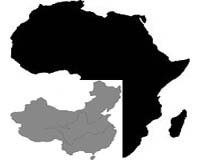 |
Portovaya Bay, Russia (UPI) Apr 9, 2010 Construction of the controversial Nord Stream pipeline linking Russia and Germany under the Baltic Sea has officially started. Portovaya Bay in Russia has surely never seen so many VIPs. Russian President Dmitry Medvedev, Dutch Prime Minister Jan Peter Balkenende, the European Union's Energy Commissioner Guenther Oettinger and former German Chancellor Gerhard Schroeder all traveled to this sea port near the Finnish border to attend Friday's ceremony launching the construction of Nord Stream. Portovaya Bay is the starting point for Nord Stream. From here, the Siberian gas is sent on a 750-mile journey under the Baltic Sea through the waters of five countries -- Russia, Finland, Sweden, Denmark and Germany -- before reaching customers in western Europe. The first of Nord Stream's twin pipelines will start operating in 2011. Officials say it will eventually deliver up to 55 billion cubic meters of gas per year to Europe -- enough for around 25 million households. Russian President Dmitry Medvedev at the ceremony called Nord Stream, which will cost $10 billion, a "contribution to Europe's energy security." Moscow has long lobbied for the project. The pipeline was designed to bypass transit countries in Eastern and Central Europe. Currently, most of the Russian gas arrives in Europe via transit pipelines through Ukraine, a country that has had shaky relations with Russia. Two major Russian-Ukrainian rows over prices temporarily halted deliveries to European customers. Its ownership structure is highly diversified: State-controlled Russian energy giant Gazprom holds the majority in the Nord Stream consortium with 51 percent, Germany's Wintershall and Eon Ruhrgas own 20 percent each with Dutch Gasunie holding the remaining 9 percent. France's GDF Suez is to become part of the consortium soon, although it's not clear where it will get the shares -- the Germans have been reported to give away 4.5 percent each but they will want something in return. Nord Stream has been mentioned by the European Commission as a priority energy project but has run into opposition from individual European states, including Poland and the Baltic countries. Critics say the pipeline is too expensive and unnecessary; environmental concerns have delayed the permitting process. Last year, governments in Germany, Russia, Denmark, Sweden and Finland gave their green light to the pipeline, with a regional Finnish environmental agency giving the final approval this year. The construction had been held up by concerns that the laying of the pipes could damage marine life and stir up toxins held in chemical weapons dumped into the Baltic Sea over the past decades. Meanwhile, Gazprom and European utilities are involved in another major pipeline project -- South Stream. It would deliver gas to Austria and Italy via the Black Sea and Bulgaria. Work on South Stream is due to start late this year.
Share This Article With Planet Earth
Related Links Powering The World in the 21st Century at Energy-Daily.com
 Africa should harness Chinese oil-interest: analyst
Africa should harness Chinese oil-interest: analystCape Town (AFP) March 16, 2010 African states should harness Chinese interest as Beijing's demand for commodities drives growth on the continent and fuels capital investments, an energy conference heard on Tuesday. China's investment model in Africa, characterised by long-term capital concessional financing, was a developmental "no-brainer," Martyn Davies, head of the Frontier Advisory firm, told the Oil and Gas Africa ex ... read more |
|
| The content herein, unless otherwise known to be public domain, are Copyright 1995-2010 - SpaceDaily. AFP and UPI Wire Stories are copyright Agence France-Presse and United Press International. ESA Portal Reports are copyright European Space Agency. All NASA sourced material is public domain. Additional copyrights may apply in whole or part to other bona fide parties. Advertising does not imply endorsement,agreement or approval of any opinions, statements or information provided by SpaceDaily on any Web page published or hosted by SpaceDaily. Privacy Statement |